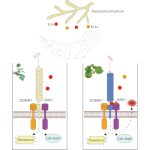Researching Abroad: Tips for Making the Transition to a New Country
Moving to a new country for higher education or research work such as an internship, a degree (bachelor’s, master’s, or PhD) or postdoctoral research, can be an exciting prospect. Many people travel to other countries to achieve their career-related goals, but you may not see any reason why you should take this step.
Why should you move to another country for research?
There are many advantages to travelling and moving countries for research. Indeed, it has been shown that scientists benefit from moving abroad over the course of their career (Sugimoto et al., 2017). In a different country, you will be exposed to new scientific points of view, which will train you to widen your perspective on your own research. Your new destination could provide you with better infrastructure and put you in contact with worldwide experts in your field, and you will be able to acquire specific skill sets beneficial for the next steps in your career. Moreover, the pool of your opportunities will enlarge as your professional (and personal) network develops, which could prove important later when you decide what you want to do next.
On a more practical note (but still worth mentioning!), depending on your current situation, choosing to move abroad could mean gaining more financial independence from your family, or even supporting it at a distance with your salary or scholarship.
Unfortunately, while the prospect can be exciting, moving abroad can be challenging. Often, as soon as you start taking steps to leave, you realize that the situation is more complicated than you thought. Based on our personal experience and that of the people around us, we came up with some tips to make the best of your experience abroad.
What to consider before you leave
Bureaucracy and administration are often obscure and confusing, especially when navigating policies in a different country and in a different language. Even after being accepted to your program, there are still many steps required before you can make the move. Going abroad often requires applying for a visa, which can take a considerable amount of time and money. You may feel like every time you manage to move one step closer, a new challenge appears.
Good news: you are not alone!
Our advice is to start early and ask around. Do not hesitate to ask your future supervisor for advice and practical help if you need it. They have likely navigated this process before helping others joining their lab from other countries and can be a great help to you. Also consider reaching out to other people or students who went through the process before you (e.g., friends, even friends of friends who come from the same country, other foreign people who were accepted to the same program before you); chances are that they experienced the same challenges and will be happy to share knowledge that might make your life a little bit easier. They can help you plan the next steps, set priorities, and make the whole process less stressful and less isolating.
You made it to a foreign country. Now what?
Building a support network from scratch, especially if you are no longer a student and you are now facing a language barrier in the new country, can be challenging.
Build a new network of people you feel comfortable with. Start from the lab by joining after-work events and organized activities, whether it is participating in journal clubs or going for pizza together after work.
Do not hesitate to extend your network beyond the lab by cultivating the hobbies you had at home and picking up new ones. Take advantage of the unique things your new home has to offer and remember that this will be one of the many places you will experience in your life – years from now, you will be happy you took the time to explore a new place and try things that you can only find there. It is also worth mentioning that having passions and interests outside the lab can make it easier to go through more difficult times (Alizadeh, 2019; Kulkarni-Khasnis, 2018). When you feel like your research is not advancing, having external sources of joy and satisfaction can be crucial to rediscover your motivation for science.
As for the language barrier, if learning the local language is a challenge that you are willing to take on, go for it! Universities often offer language courses for international staff at competitive prices. On the upside, a better understanding of the local language may help you feel less isolated and more integrated in your new environment. Having someone to practice with, ideally a colleague or a friend that you feel comfortable with, can reduce the stress associated with learning a new language. However, be careful not to turn this into a new source of stress – talk to your supervisor to ensure day-to-day meetings and job tasks are discussed in a common language.
The bottom line: Be flexible!
Be open to what the new place has to offer, both scientifically and culturally. This is, at the end of the day, the best way to enjoy a new phase in your life and to grow as a person.
References
- Alizadeh J. (2019). How pastimes help you score in science. Nature, 10.1038/d41586-019-01295-3. Advance online publication. https://doi.org/10.1038/d41586-019-01295-3
- Kulkarni-Khasnis, M. (2018). How music helped me to flourish. Nature. https://doi.org/10.1038/d41586-018-05899-z
- Sugimoto, C. R., Robinson-Garcia, N., Murray, D. S., Yegros-Yegros, A., Costas, R., & Larivière, V. (2017). Scientists have most impact when they’re free to move. Nature, 550(7674), 29–31. https://doi.org/10.1038/550029a
______________________________________________
About the Authors
Laura Turchi is PhD Candidate in Grenoble, France, and a 2023 Plantae Fellow. Her work aims at modeling how transcription factors regulate gene expression in plants, with a strong link between bioinformatics and molecular biology. You can find her on Twitter at @turchi_l.
Sourav Mukherjee is pursuing PhD in genetics at Monash University, Australia, and a 2023 Plantae Fellow. His study involves understanding the molecular mechanism of temperature responses in Arabidopsis. You can find him on Twitter at @SouravBiotech.



